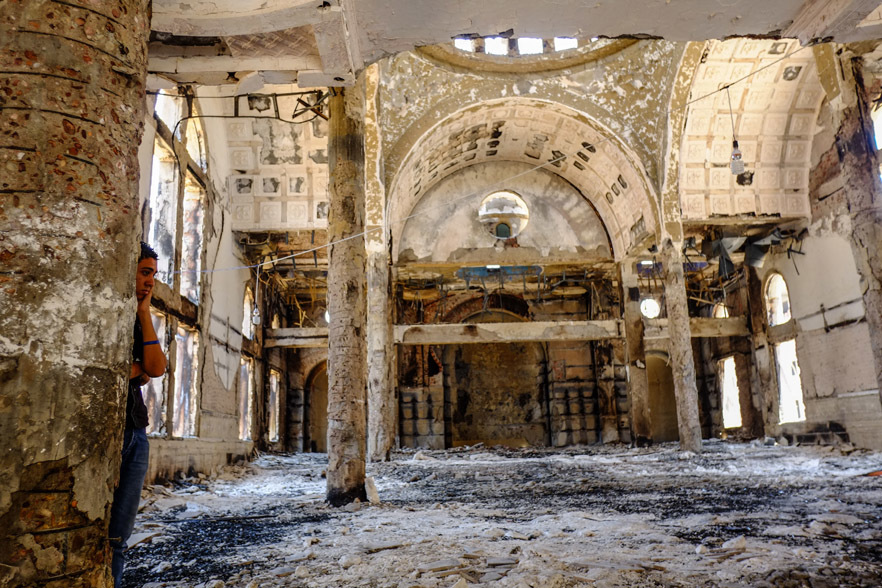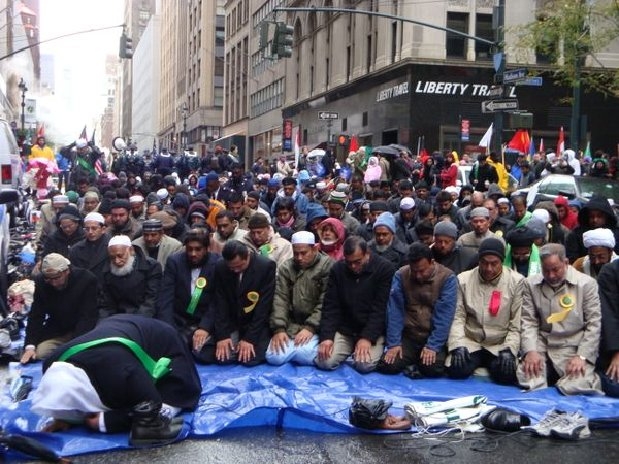
While the civilized people on our planet are preoccupied with freedom, development, and the defense of human rights anywhere and everywhere, and with conducting more and more scientific research to eliminate diseases that threaten human life (such as tuberculosis and cancer and so on), and in making discoveries in medicine that benefit every human being on earth – Muslim fundamentalists are preoccupied with a sick utopian dream: Islam must prevail in every spot on our globe.
IN ORDER FOR this dream to be realized, one necessary condition must first be met: that is, that all the peoples of the world are to embrace Islam. If this condition is not met, then we are undergo a colonial occupation, whereby non-Muslims are to be rendered subject to the Muslims that invade their lands.
In writing this I am fully aware of this miserable dark fantasy, and I am aware that the process of history, while tortuous at times, does not go backwards. I am, however, concerned with the rising tide of Islamic fundamentalism in Europe, where Muslims (Arabs in particular) refuse to integrate into the same European society that provided them with the right of residence, the right to work, and even the right of full citizenship, to the point that there are Muslims who have assumed the highest positions in these societies.
Despite all these rights – rights that they do not have in their countries of origin – they insist on going against the tide of history, and they hold that their true happiness can only be achieved by imposing their religious beliefs on the very society to which they migrated of their own free will. That is, they are not content with the right granted them to freely practice the rituals of their faith, or build mosques and what have you, but they aspire to something more than that: the right to deviate from the traditions and culture of the society in which they are living. They claim, for example, the right to impose the wearing of the veil or the right to slaughter livestock in the streets at the ‘Īd al-Aḍḥā or the right to build minarets towering over their mosques (although mosques at the beginning of Islam were without minarets) all with microphones installed on them, or the right to pray in the streets and squares. They do all this knowing that an Arab country (Saudi Arabia) does not allow the building of a church inside its territory, and that a country like Egypt – as a result of the fundamentalists’ control over the prevailing culture since July 1952 – places obstacles before Christians, whether in terms of building new churches or renovating and repairing old ones.[1]
The logical corollary is that non-Muslims are of necessity criminals and that Muslims are of necessity not criminals
But the most perilous thing, from what I have heard from enlightened friends and relatives working in Europe, is that a majority of Muslim/Arab families instill in their children a hatred of European society. Their argument is that Europe is a society of infidels and that Christians are polytheists since they uphold the doctrine of the Trinity, which is held to run counter to Islamic monotheism.
Following on from this preparatory starting point the parents’ concluding advice to their children is this: ‘Do not babysit Christian children, do not befriend them, do not eat with them, and do not play with them’. The result of this is two-fold: the separation of Muslim children from the society in which they live (thus deepening the feeling of estrangement and alienation) and the heightening of a sense of distinctness. The child at the same time grows up in Europe with a deep sense of being something unfamiliar and alien to the society in which his parents and older sisters have lived. These repressed feelings continue to seethe until the child turns into a young adult and realizes that he is living in a society that is divided against itself, one that is no longer a single homogeneous society, and therefore (as sociologists and anthropologists confirm) lacks its most important component: the concept of the nation state and its goal of embracing all peoples of the country, regardless of their religious beliefs and denominations. This is one of the principles of universal human rights on which they were brought up.
The insistence, by Muslims, on maintaining a distinction within the European community has spawned the most dangerous form of social virus: intolerance. The historical root for this goes right back to the Qur’ān, which declared Christians to be ‘infidels’,[2] instructed them ‘not to take Jews and Christians as allies’,[3] and commanded to kill those held to be infidels:
O you who have believed, fight those of the infidels who are close to you and let them find harshness in you. [4]
This verse, in the opinion of the interpreters of the Qur’ān, does not stop at the infidels of Quraysh nor does it address them alone, but rather extends to all infidels in ages to come. Moreover, the Qur’ān differentiates between Muslims and ‘criminals’:
Shall We then treat those who have surrendered [i.e. ‘Muslims’] as We treat the criminals?.[5]
This verse makes Muslims the ‘opposite’ of criminals. The logical corollary of this is that non-Muslims are of necessity criminals and that Muslims are of necessity not criminals. Since the Muslim – the fundamentalist especially – believes that the Qur’ān cannot perpetrate a falsehood, the believer must hold everything that is stated in it to be true. In his Commentary on the verse ‘Indeed, the religion with God is Islam’,[6] Ibn Kathīr stated:
This is a message from the Almighty, that there is no religion that He accepts from anyone other than Islam,
and that this was confirmed in verse 85 of Sūrat ʽImrān:
And whoever seeks a religion other than Islam, it will not be accepted And in the Hereafter he will be one of the losers.
And as regards the differentiation of Muslims from the rest of mankind, verse 110 of the same Sūra states ‘Ye are the best community that hath been raised up for mankind.’
The second level of authority are the hadiths of Muhammad, such as the following:
I have been commanded to fight people until they testify that there is no god but God and that Muhammad is the Messenger of God.[7]
A ṣaḥīḥ (‘authenticated’) hadith of the Prophet runs:
Do not ask the People of the Book about anything, for they will not guide you and they have gone astray, for you will either believe in a falsehood, or declare false that which is the Truth[8]
In the history of al-Ṭabarī and the biography of al-Ḥalabiyya the Prophet is to have said:
I call upon the people of Quraysh to speak words that Arabs will grant credit them for, and by which they rule over the ‘ajam (‘non-Arabs’) [9]
‘Now the word ‘ajam in the Arabic language means ‘dumb animals’, and the ‘ajam are those who are hostile to the Arabs, and these ‘ajam are those who do not speak the Arabic language’.[10] Following from this the Prophet said:
I was sent with the sword, and goodness is in the sword … My nation will continue to prosper as long as it carries swords[11]
And he also said:
If you enter into an ʽĪna transaction,[12] or take hold of the tails of cattle, or become contented with agriculture and give up Jihād – Allah will make disgrace prevail over you and will not remove it from you till you return to your religion.
Similarly:
He who fights so that Allah’s Word (Islam) should be superior, then he fights in Allah’s cause.[13]
He who does not join a war-like expedition, or equip a warrior, or look well after a warrior’s family when he is away, will be smitten by God with a sudden calamity before the day of resurrection[14]
He who dies without having fought or having felt fighting (against the infidels) to be his duty will die guilty of a kind of hypocrisy[15]
This historical root was seized upon by Ḥasan Al-Bannā’ and the Muslim Brotherhood with their call to ‘chase away the wiles of Judaism and combat Christianity’. They held that, thanks to Islam,
The supremacist and exclusionary discourse in Egypt has its supporters in Europe, albeit passing under many names under the guise of ‘Islamic research centers’
Christianity’s shadow was removed from the African and Asian continents, and confined Europe under the shadow of the Roman Empire. The Islamic State also enclosed western Europe since the Islamic fleets sailed over the waves of the Mediterranean Sea and the Red Sea turning it into an Islamic lake.[16]
‘Abd al-Qādir ‘Awda put it this way:
The nature of Islam is that it rises and nothing rises above it, and that it is to impose its rule over lands and extend its authority over the whole world.[17]
And if we jump forward a bit we find that Muhammad Morsi, before assuming the presidency, declared “We will renew the Islamic conquest of Egypt.” [18] According to his view Islam therefore hadn’t yet entered Egypt. The same idea was stated by A. Ṭāriq Al-Bushrā as “Egypt needs to complete its Islam”.[19] Al-Bushrā also stated that “the Muslim Brotherhood does not accept the possibility of a Christian or a woman to be a head of state.”[20] These are just some, and by no means exhaustive, examples.

Suggested Reading
This supremacist and exclusionary discourse in Egypt has its supporters in Europe, albeit passing under many names with the form of ‘Islamic research centers’. Here they rehearse their perceptions on infidel societies, and on Islam having divided up the world into two camps: those who have faith (the Muslims) and disbelievers (non-Muslims in all parts of the world). If I were to venture an opinion on the situation of Muslims in Europe for the purpose of social stability, it would be that my hope is that Muslim liberal thinkers will adopt an enlightening discourse, one that is founded upon separating religious belief from any national affiliation. And it is my hope that the Muslim who insists on his beliefs – conflating patriotism with religious faith and insisting on declaring as ‘infidel’ the society that accepted his immigration, gave him shelter and employment – should by logic return to his original homeland if he is unable to live with a society whose culture, traditions, and customs he views as contradicting his beliefs.
[1] On the subject of the destruction of Christian churches and the prohibitions on their repair, see a list here of classical Islamic scholarly works (Ed.)
[2] Qur’ān V (Al-Mā’ida) 17, 72, 73.
[3] Qur’ān V (Al-Mā’ida) 51, III (Āl ‘Imrān), 28.
[4] Qur’ān IX (Al-Tawba) 123.
[5] Qur’ān LXVIII (Al-Qalam) 35.
[6] Qur’ān III (Āl ‘Imrān), 19.
[7] According to Ibn Kathīr (Vol II, pp.1338, 1339) it was recorded in the Ṣahīḥayn on the authority of ‘Amr ibn al-Khaṭṭāb and in Ṣaḥīḥ al-Musnad, 12643. See also Mishkāt al-Maṣābīḥ 12.
[8] Musnad Aḥmad, 14631.
[9] Al-Ṭabarī is here commenting on the Qur’ānic verse XXXVIII (Ṣād), 7, referring to Muhammad’s declaration that there is only one God: We never heard of this in the former faith; this is nothing but an invention. (Ed.)
[10] Mukhtār Al-Ṣiḥāḥ, Al-Amiri Press in Cairo, 1911, p.440.
[11] The text is given by al-Maʽarrī in his Risālat al-Ghufrān as: رُوي عنه أنه قال”بعثت بالسيف، والخير في السيف،والخير بالسيف”.وفي حديث آخر “لاتزال أمتي بخير ما حملت السيوف (‘It was narrated that he said, “I was sent with the sword, and goodness is in the sword, and goodness is with the sword.” And in another hadith, “My nation will continue to prosper as long as it carries swords.”’) (Ed.)
[12] That is, if you sell anything on credit to anyone, on the condition that you will buy it back for a lower price (al-ʽĪna). The hadith is in Bulūgh al-Marām Book 7, Hadith 75 and Sunan Abī Dāwūd 3462. (Ed.).
[13] Passim. E.g. Mishkāt al-Maṣābīḥ 3814; Ṣaḥīḥ al-Bukhārī 123; Ṣaḥīḥ al-Bukhārī 3126; Jami` at-Tirmidhi 1646 (Ed.)
[14] Mishkāt al-Maṣābīḥ 3820; Riyāḍ as-Ṣāliḥīn 1348; Sunan Abī Dāwūd 2503 (Ed.)
[15] Sunan Abī Dāwūd 2502; Riyāḍ as-Ṣāliḥīn 1341; Sunan al-Nasā’ī 3097; Mishkāt al-Maṣābīḥ 3813; Ṣaḥīḥ Muslim 1910 (Ed.)
[16] Dr. Raouf Shalabi, Shaykh Hassan Al-Banna and his school, p. 324.
[17] AL-Sayyid Yūsuf, The Muslim Brotherhood and the Roots of Extremism, Hay’at al-Kitāb al-Miṣriyya, Year 99, p.579.
[18] Majid Attia, Watani 6/5/2012.
[19] From A. Samīr Farīd, Al-Masrī Al-Yawm 12/7/2011).
[20] Al-Masrī Al-Yawm, 4/24/2011.
Main image: A church in Minya torched by anti-government protesters in August 2013. During August 14-17 unrest following dispersal of Muslim Brotherhood camps and supporters of ousted Islamist President Morsi by the police and the military, about 50 churches were destroyed and burned down including 30 Orthodox Coptic churches, 14 Catholic churches and monasteries as well as 6 Protestant prayer houses.

